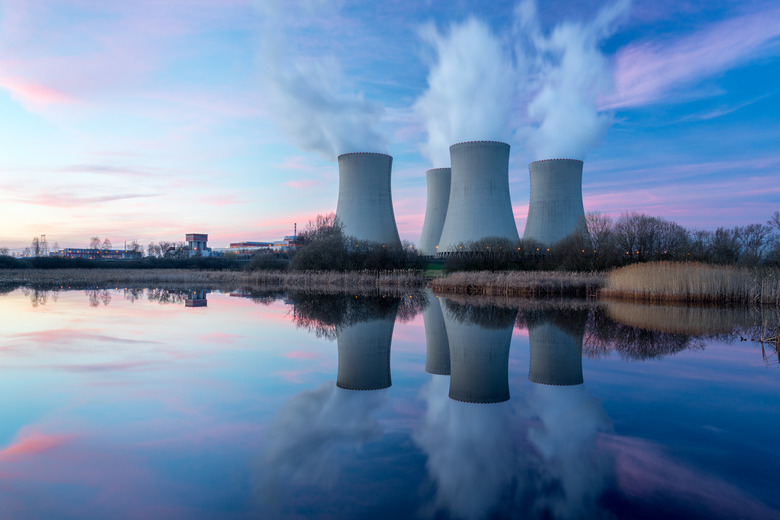How Does Nuclear Energy Affect The Environment?
Nuclear energy has been proposed as an answer to the need for a clean energy source as opposed to CO2-producing plants. Nuclear energy is not necessarily a clean energy source. The effects nuclear energy have on the environment pose serious concerns that need to be considered, especially before the decision to build additional nuclear power plants is made.
TL;DR (Too Long; Didn't Read)
Nuclear energy does not release greenhouse gasses so does not contribute to global climate change. However, nuclear wastes are difficult to manage and accidents — and the threat of terrorism — are serious concerns.
Carbon Dioxide
Carbon Dioxide
Nuclear power has been called a clean source of energy because the power plants do not release carbon dioxide. While this is true, it is deceiving. Nuclear power plants may not emit carbon dioxide during operation, but high amounts of carbon dioxide are emitted in activities related to building and running the plants. Nuclear power plants use uranium as fuel. The process of mining uranium releases high amounts of carbon dioxide into the environment. Carbon dioxide is also released into the environment when new nuclear power plants are built. Finally, the transport of radioactive waste also causes carbon dioxide emissions.
Low Level Radiation
Low Level Radiation
Nuclear power plants constantly emit low levels of radiation into the environment. There is a differing of opinion among scientists over the effects caused by constant low levels of radiation. Various scientific studies have shown an increased rate of cancer among people who live near nuclear power plants. Long-term exposure to low level radiation has been shown to damage DNA. The degree of damage low levels of radiation cause to wildlife, plants and the ozone layer is not fully understood. More research is being done to determine the magnitude of effects caused by low levels of radiation in the environment.
Radioacative Waste
Radioacative Waste
Radioactive waste is a huge concern. Waste from nuclear power plants can remain active for hundreds of thousands of years. Currently, much of the radioactive waste from nuclear power plants has been stored at the power plant. Due to space constraints, eventually the radioactive waste will need to be relocated. Plans have been proposed to bury the radioactive waste contained in casks in the Yucca Mountains in Nevada.
There are several issues with burying the radioactive waste. Waste would be transported in large trucks. In the event of an accident, the radioactive waste could possibly leak. Another issue is uncertainty about whether the casks will leak after the waste is buried. The current amount of radioactive waste requiring long-term storage would fill the Yucca Mountains and new sites would need to be found to bury future radioactive waste. There is no current solution to deal with the issue of radioactive waste. Some scientists feel that the idea of building more nuclear power plants and worrying about dealing with the waste later has the potential of a dangerous outcome.
Cooling Water System
Cooling Water System
Cooling systems are used to keep nuclear power plants from overheating. There are two main environmental problems associated with nuclear power plant cooling systems. First, the cooling system pulls water from an ocean or river source. Fish are inadvertently captured in the cooling system intake and killed. Second, after the water is used to cool the power plant, it is returned to the ocean or river. The water that is returned is approximately 25 degrees warmer than the water was originally. The warmer water kills some species of fish and plant life.
Nuclear Power Plant Accidents and Terrorism
Nuclear Power Plant Accidents and Terrorism
According to the Union of Concerned Scientists, regulated safety procedures are not being followed to ensure that nuclear power plants are safe. Even if all safety precautions are followed, it is no guarantee that a nuclear power plant accident will not occur. If a nuclear power plant accident occurs, the environment and surrounding people could be exposed to high levels of radiation. The 2011 accident at the nuclear power plant in Fukushima, Japan is one of the worst nuclear disasters in history; the reactors were destroyed by a tsunami following a major earthquake. Terrorism threats are another concern that needs to be addressed. A satisfactory plan to protect nuclear power plants from terrorism is not in place.
Conclusion
Conclusion
There is no disagreement that clean sources of energy are vital to the environment. The disagreement lies in what form that clean energy should be in. Supporters of nuclear energy argue that it is an efficient source of energy that is easy to implement. People against nuclear energy propose using combined methods of solar, wind and geothermal energy. Solar, wind and geothermal energy still have environmental issues, but ones that are not as great as nuclear plants or coal-burning power plants.
Cite This Article
MLA
Kivi, Rose. "How Does Nuclear Energy Affect The Environment?" sciencing.com, https://www.sciencing.com/nuclear-energy-affect-environment-4566966/. 25 April 2018.
APA
Kivi, Rose. (2018, April 25). How Does Nuclear Energy Affect The Environment?. sciencing.com. Retrieved from https://www.sciencing.com/nuclear-energy-affect-environment-4566966/
Chicago
Kivi, Rose. How Does Nuclear Energy Affect The Environment? last modified March 24, 2022. https://www.sciencing.com/nuclear-energy-affect-environment-4566966/
